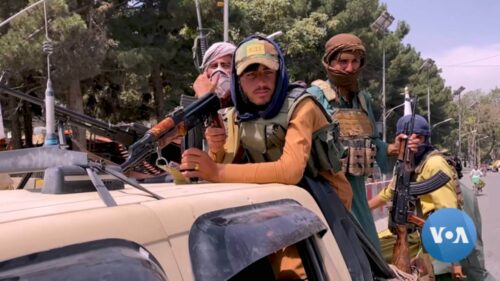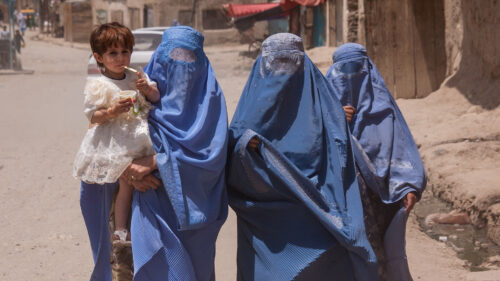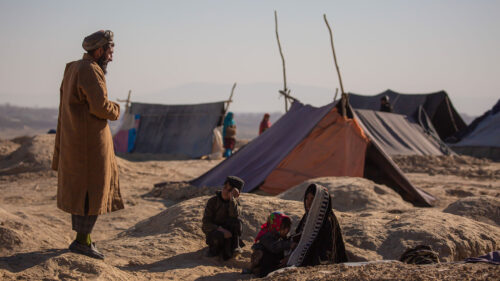The Pashtun-backed Sunni Islamist movement known as the Taliban emerged in the 1990s. Following rapid territorial expansion, they dominated much of Afghanistan between 1996 and their subsequent ousting by the United States in 2001. Their rule was marked by a stringent interpretation of Islamic law, resulting in severe restrictions on individual liberties, particularly for women. This, combined with their documented support for and harboring of international terrorist organizations such as al-Qaeda, attracted widespread international condemnation and ultimately contributed to their downfall.
However, on August 15, 2021, the Taliban recaptured the capital Kabul, forcing President Ashraf Ghani to flee. After two years in power, they continue their rule through brutal force and blatant human rights violations, shrouded in a false pretense of maintaining law and order.
Despite fervent attempts to secure international recognition, the Taliban regime in Afghanistan remains largely ostracized on the global stage. This lack of recognition severely restricts their legal and diplomatic capabilities, impedes their access to vital international organizations and isolates them from potential economic partnerships and security collaborations.
The prospect of an Afghanistan government-in-exile gains increasing traction in light of the Taliban’s repressive policies and limited international recognition. Such a government could offer a legitimate alternative to the current regime, thereby ensuring the continued representation of the people of Afghanistan at the international level.
Taliban-led Afghanistan is a country on the brink
Since their swift return to power, the Taliban’s resurgence has plunged Afghanistan into a crisis that threatens the very fabric of its society and jeopardizes the well-being of Afghanistan’s citizens.
The initial hopes for moderation from the Taliban have dissipated, replaced by a stark reality of repression and regression. Women and girls, once again, bear the brunt of their oppressive policies. Restrictive measures dictate their attire, limit their movement and confine them to the private sphere, stripping them of basic freedoms and fundamental rights.
Under Taliban rule, dissenters face an era of heightened fear and persecution. Journalists, activists and former security personnel endure arbitrary arrests, torture and even extrajudicial execution. This systematic and discriminatory targeting constitutes a blatant violation of international law and raises serious concerns about the Taliban’s disregard for human dignity and equality.
The economic situation in Afghanistan under Taliban rule is equally alarming. Their isolationist policies and strict restrictions have severely hampered economic growth. International sanctions, coupled with the withdrawal of foreign aid, have exacerbated the situation, leading to a severe shortage of essential goods and services. The private sector, already fragile, struggles to survive amidst limited trade opportunities and widespread corruption within the public sector.
The Taliban’s self-proclaimed war on corruption appears hollow, as reports of nepotism, extortion and misappropriation of public funds continue to surface.This, coupled with the opaque nature of their mining practices has resulted in the deterioration of vital infrastructure, hindering economic development and further marginalizing vulnerable populations.
Perhaps most concerning is the Taliban’s apparent tolerance, if not tacit support, for international terrorist groups like al-Qaeda. Despite initial assurances of cracking down on such organizations, they have failed to suppress their activities within Afghanistan’s territory. This inaction, coupled with the reported presence of high-profile jihadists, fuels fears that Afghanistan could once again become a haven for extremism. The recent killing of al-Qaeda leader Ayman al-Zawahiri by a US airstrike in Kabul serves as a stark reminder of this alarming reality.
An authority in exile: an answer to the deteriorating conditions in Afghanistan
The concept of an authority-in-exile occupies a well-defined niche in both international law and political practice. This phenomenon typically arises from political upheaval or conflict, situations where a legitimate government is forcibly displaced from its home territory. Despite their displacement, these individuals or groups maintain their claim to authority and legitimacy, often seeking international recognition and support for their cause. Operating from abroad, they act on behalf of the existing state or a potential future state to be created. Their primary objectives are to uphold their rights and represent the interests of their people until a resolution or transition of power occurs.
It is crucial to distinguish an authority-in-exile from other related entities. Unlike a rump state, which retains control over a portion of its territory, or a secessionist movement, which seeks to establish a new independent state, an authority-in-exile claims to represent the entire existing state and its people. Furthermore, it differs from a simple opposition group, which lacks the claim to represent the whole state and its population.
The establishment of exile authorities has a long and storied history, often employed by states when their territory falls under the effective control of a belligerent occupier or when a new authority comes to power through revolution or coup d’état. Notable past examples include the African National Congress in Exile, the Provisional Government of Bangladesh and the Afghan Interim Government.
In the specific context of Afghanistan, an authority-in-exile would be a body with legal status, empowered to protect its nationals and act on behalf of the people of Afghanistan in the international arena. This authority may not necessarily function as a “government” in the strict sense of international law. Instead, it may serve as a means to protect and advance democratic values within Afghanistan.
However, the success of such an entity hinges on its careful composition and structure. Key considerations include:
— Inclusive Representation and Diverse Perspectives: Comprised of prominent intellectuals of Afghanistan, activists and diverse ethnic and religious group representatives united by a vision for a democratic Afghanistan, the authority ensures comprehensive representation. This empowers it to effectively address the needs and aspirations of all citizens of Afghanistan within and outside the country.
— Efficient Governance through Specialized Committees: Establishing specialized committees dedicated to critical areas like diplomacy, trade, security and cultural exchange enhances the authority’s efficiency in managing responsibilities and engaging with international partners.
— Phased Transition: Parliament-in-Exile to Government-in-Exile: An initial phase as an inclusive and pluralistic parliament-in-exile, later transitioning to a full-fledged government-in-exile, is crucial for maintaining the authority’s legitimacy and relevance internationally.
— Active Engagement with the International Community: Active engagement with international partners is essential for the authority to establish itself as a credible and influential entity capable of contributing to global governance and diplomacy.
— Drafting a New Constitution: Involving experienced individuals in governance and diplomacy in drafting the new constitution is vital. Their expertise ensures it reflects the diverse needs and aspirations of the people of Afghanistan, laying the foundation for a stable and inclusive future government.
— Smooth Transition of Power: The authority-in-exile should provide a framework for a smooth transition of power, mitigating potential conflicts and disruptions in the future.
— Location and Legitimacy: While establishing the authority in a friendly nation with international influence can offer protection, the ultimate success in replacing the in situ government relies heavily on international recognition of the exiled entity as the legitimate representatives of a democratic Afghanistan. This recognition strengthens their position in negotiations for a peaceful resolution.
— Quality and Representation: The authority-in-exile’s quality and representativeness are crucial, as it should act for the people and against the current regime. Its primary aim is to prevent further repression and establish a democratic Afghanistan, free from coups, revolutions and undemocratic power grabs.
Though aspirations for an Afghanistan government-in-exile endure, no recognized entity currently exists. Former Vice President Saleh’s self-proclaimed caretaker presidency on August 17, 2021, lacks international recognition. Notably, self-declared leadership does not constitute a legitimate government-in-exile, which requires structure, functionality and global legitimacy — presently absent in this context. Until these elements are fulfilled, the idea of a functioning Afghanistan government-in-exile remains unfulfilled.
[Ali Omar Forozish edited this piece.]
The views expressed in this article are the author’s own and do not necessarily reflect Fair Observer’s editorial policy.
Support Fair Observer
We rely on your support for our independence, diversity and quality.
For more than 10 years, Fair Observer has been free, fair and independent. No billionaire owns us, no advertisers control us. We are a reader-supported nonprofit. Unlike many other publications, we keep our content free for readers regardless of where they live or whether they can afford to pay. We have no paywalls and no ads.
In the post-truth era of fake news, echo chambers and filter bubbles, we publish a plurality of perspectives from around the world. Anyone can publish with us, but everyone goes through a rigorous editorial process. So, you get fact-checked, well-reasoned content instead of noise.
We publish 2,500+ voices from 90+ countries. We also conduct education and training programs
on subjects ranging from digital media and journalism to writing and critical thinking. This
doesn’t come cheap. Servers, editors, trainers and web developers cost
money.
Please consider supporting us on a regular basis as a recurring donor or a
sustaining member.
Will you support FO’s journalism?
We rely on your support for our independence, diversity and quality.










Comment